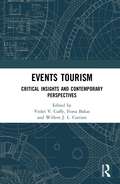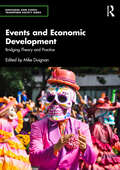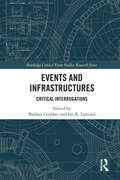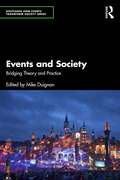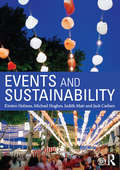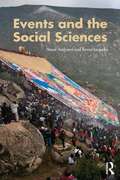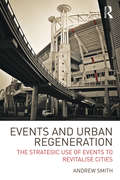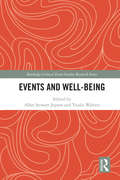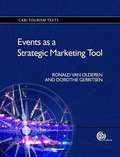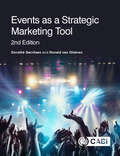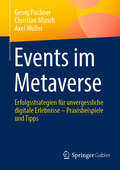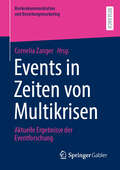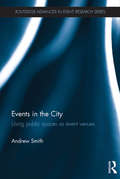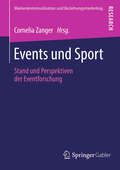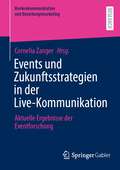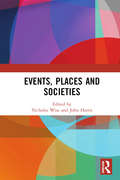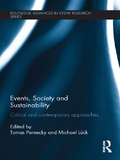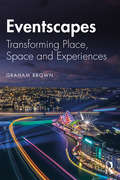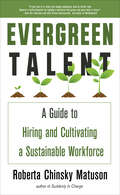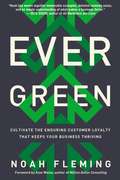- Table View
- List View
Events Tourism: Critical Insights and Contemporary Perspectives (Routledge Critical Event Studies Research Series.)
by Violet V. Cuffy; Fiona Bakas; and Willem J. L. CoetzeeThis book presents critical insights and contemporary perspectives for exploring current trends, concerns and prospects of events tourism. It examines modern-day global issues facing the events and tourism industry, policymakers, researchers and academics to advance understanding of practice and development of theory. Organised in four parts, this book examines how events tourism is designed, planned and delivered. The first part engages with the core, fundamental concepts of events tourism which establish a basic understanding of the field. The second part addresses contemporary issues related to visitor attractions, music festivals, small and user-generated events, wanderlust and entrepreneurship. The third part focuses on meetings and challenges in the conference industry after disasters, the economic impact and other dilemmas of mega-events, and city and destination concerns. The fourth and final part provides a peek into the future of events tourism vis-à-vis reshaping cities, music festivals and critical dilemmas of the 21st century. With an international appeal because of cross-national contributions, this book will interest events and tourism practitioners, academics, students, researchers, policymakers, and business and investment sector professionals across the globe.
Events and Economic Development: Bridging Theory and Practice (Routledge How Events Transform Society series)
by Mike DuignanEvents and Economic Development explores the economic impact and developmental implications of designing, planning, and delivering major events – from cultural events like the Notting Hill Carnival and Day of the Dead, to sporting events like the Olympics to the Super Bowl.This book comprises 24 chapters, each addressing various diverse and interconnected topics related to the economic and development implications of hosting events. Each chapter follows a consistent structure, beginning with the aim and learning objective(s), followed by theoretical focuses and the significance of these perspectives. Similarly, practical focuses and their significance are also outlined. The main body of each chapter consists of an 800 to 2000-word argument. Following the argument, chapters include managerial, policy, and/or research implications, explicitly mapping how they relate to the UN Sustainable Development Goals. Each chapter concludes with a series of quizzes to test knowledge and debate questions to engage learners in discussing and interrogating the argument.Some of the topics covered include: Nation Branding through Events Urban Transformation via Events Commercialization of Culture and Events Crisis and Resilience in Event Management Sustainability in Event Hosting Cultural Identity and Heritage Preservation Globalization of Sports and Festivals Media and Narrative Evolution Ethics and Sponsorship in Events Community Impacts and Gentrification This innovative, topical, engaging, and comprehensive book is an essential reading and teaching resource for all students and lecturers in events that are easy to integrate into educational programmes.
Events and Infrastructures: Critical Interrogations (ISSN)
by Ian R. Lamond Barbara GrabherInnovative and the first of its kind, this informative and multidisciplinary book explores the socio-cultural significance inherent in event infrastructures.While mainstream event management literature addresses event infrastructures mainly through its operational relevance, this carefully compiled edited volume takes infrastructures as an analytical point in respect to its social, political, economic and cultural potential of the study of events. Borrowing from the ongoing social scientific debates on the geography, sociology and anthropology of infrastructures, critical questions are posed in relation to the event contexts. With references to events in Argentina, Malawi, Spain and the UK, among others, the volume combines an international perspective with a highly relevant subject for contemporary event management education.By bringing together theoretical as well as empirical readings on the question of event infrastructures from a critical point of view, the debates are relevant to practitioners and researchers as well as undergraduate and postgraduate students in the field of events, leisure, tourism, anthropology, sociology, geography and urban planning – among others.
Events and Society: Bridging Theory and Practice (Routledge How Events Transform Society series)
by Mike DuignanEvents of all shapes and sizes play an important part in all of our lives. They are fun, frivolous, and often allow us to escape from our everyday lives – and they are also fascinating to study and examine in a more serious way, to understand what they mean and what they do for us – individually and collectively. Events in Society, therefore, explores the social impact and sociological implications of designing, planning, and delivering events – cultural events like the Edinburgh Fringe Festival; sporting events like the Olympic and Paralympic Games and FIFA World Cup; to music festivals like Glastonbury.Thirty carefully selected contributions feature, written by global experts in a short and succinct way that are easy to digest, covering a variety of disciplines, fields, contexts, and cases. Every chapter explores a critical issue or debate based on real-life events, and contextualises this within the key theoretical debates, managerial, and policy implications. Throughout, there are linkages to the UN Sustainable Development Goals, as well as interactive features to aid understanding and spur critical thinking, including learning objectives, quiz questions, and debate questions per chapter.Some of the topics covered include: Uniting nations and people Personal experiences and transformations Social critique and explorations Activism Programming and representation Health, safety, and security Identity and gender LGBTQ+ Environmentalism Displacement and exclusion Education and participation Community development Disability and accessibility This innovative, topical, engaging, and comprehensive book is an essential reading and teaching resource for all students and lecturers in events that are easy to integrate into educational programmes.
Events and Sustainability
by Michael Hughes Jack Carlsen Kirsten Holmes Judith MairIncreasing concerns over climate and environmental change, the global economic and financial crisis and impacts on host communities, audiences, participants and destinations has reinforced the need for more sustainable approaches to events. Sustainability now features as part of the bid process for many mega-events, such as the Olympic Games, as well as significant regional and local events, where the event organisers are required by funding bodies and governments to generate broader outcomes for the locality. This book is the first to offer students a comprehensive introduction to the full range of issues and topics relevant to event sustainability including impacts, operating and policy environments, stimulating urban regeneration and creating lasting legacies, as well as practical knowledge on how to achieve a sustainable event. Taking a holistic approach drawing on multidisciplinary theory it offers insight into the economic, socio-cultural and environmental impacts and how these can be adapted or mitigated. Theory and practice are linked through integrated case studies based on a wide range of event types from mega events to community festivals to show impacts, best practice and how better sustainable practice can be achieved in the future. Learning objectives, discussion questions and further reading suggestions are included to aid understanding and further knowledge; additional resources for lecturers and students including power point slides, video and web links are available online. Events and Sustainability is essential reading for all events management students and future managers.
Events and The Social Sciences
by Hazel Andrews Teresa LeopoldAs the events management field expands as an area of study, there is a need to move beyond the business and marketing-driven approaches which dominate the literature towards a more advanced conceptual analysis and understanding of events from a socio-cultural context. This book addresses this need by examining intersections between the social sciences and the emerging field of events management. It applies and specifically contextualises social science theories within the discourse of events to provide a greater understanding of the significance of events in contemporary society. It first outlines the value of approaching the study of events from a social science perspective, and then moves on to an in-depth exploration of relevant theories exploring topics such as identity, culture, consumerism, representation and place. It concludes with a summary of each chapter and a discussion of ways in which events can be further explored through the lens of the social sciences. The book features international case studies based on a variety of event types ranging from sports events, religious and cultural events and community events, which are used throughout to address contemporary issues and show theory in practice. 'Think Points' are integrated into each chapter to encourage the reader to reflect on theories, and each chapter concludes with summary points, further reading and links to useful websites to consolidate learning and further knowledge. This book will provide upper-level students, academics and researchers interested in events, as well as those from related social science disciplines, with a robust socio-cultural conceptual analysis of the subject and a greater understanding of the significance of events in contemporary society.
Events and Urban Regeneration: The Strategic Use of Events to Revitalise Cities
by Andrew SmithIn recent years, major sporting and cultural events such as the Olympic Games have emerged as significant elements of public policy, particularly in efforts to achieve urban regeneration. As well as opportunities arising from new venues, these events are viewed as a way of stimulating investment, gaining civic engagement and publicizing progress to assist the urban regeneration process more generally. However, the pursuit of regeneration involving events is a practice that is poorly understood, controversial and risky. Events and Urban Regeneration is the first book dedicated to the use of events in regeneration. It explores the relationship between events and regeneration by analyzing a range of cities and a range of sporting and cultural events projects. It considers various theoretical perspectives to provide insight into why major events are important to contemporary cites. It examines the different ways that events can assist regeneration, as well as problems and issues associated with this unconventional form of public policy. It identifies key issues faced by those tasked with using events to assist regeneration and suggests how practices could be improved in the future. The book adopts a multi-disciplinary perspective, drawing together ideas from the geography, urban planning and tourism literatures, as well as from the emerging events and regeneration fields. It illustrates arguments with a range of international case studies placed within and at the end of chapters to show positive outcomes that have been achieved and examples of high profile failures. This timely book is essential reading for students and practitioners who are interested in events, urban planning, urban geography and tourism.
Events and Well-being (Routledge Critical Event Studies Research Series.)
by Allan Stewart Jepson; Trudie WaltersThis book is the first to take an in-depth examination of events and well-being, adopting a much-needed critical approach to the study of events. It uses empirical case studies to help us better understand how events foster positive well-being or counter negative well-being for event organisers, participants, spectators, volunteers and even non-attending local residents. While researchers have long understood socialisation as the major motivation to attend contemporary festivals and events, it is only just being acknowledged that well-being is also a key motivator. Those researching in the field of event studies are yet to clearly articulate "the how, why, where, and impacts of socialisation." This multidisciplinary book draws together empirical research across a range of event types and sizes, from music festivals to mega sports events, to provide a nuanced understanding of their contribution to the well-being of individuals and communities. Case studies are drawn from around the world and apply a diverse range of theoretical lenses to the conceptualisation of well-being as it applies to events and methodologies used to achieve research aims and objectives. This significant volume will be valuable reading for students and academics in the fields of sport studies, critical event studies, queer studies, cultural studies, tourism, music, sociology and end-of-life studies.
Events as a Strategic Marketing Tool
by Dorothe Gerritsen Ronald Van OlderenExperiences, encounters and events have come to play an ever-growing role in marketing as their impact is more fully understood. As a profession, however, event marketing is still a relatively new field, with most available literature covering practical project management rather than the strategy behind including events in a marketing campaign. Addressing this gap, Events as a Strategic Marketing Tool reviews the way organizations utilize events to connect with their visitors. It covers the development of the experience economy, the step from strategy to concept, event design and touchpoints. Written in an accessible style, it also considers the areas of marketing within which experiences play a role, such as branding, relationship marketing and city marketing. Concluding with a chapter on effect measurement and evaluation, Events as a Strategic Marketing Tool provides an engaging resource for both students and professionals interested in leisure, tourism and events. Including a wealth of internationally relevant examples, it gives a thorough insight into the way events can help reach strategic marketing goals.
Events as a Strategic Marketing Tool (Tourism Studies)
by Dorothé Gerritsen Ronald van OlderenEvents have come to play an ever-growing role in marketing; by connecting products and services with experiences and vice versa, producers can create important added value. Events as a Strategic Marketing Tool, 2nd edition describes how events can be used as a strategic tool in marketing practices. Fully updated and with new case studies throughout, this second edition reviews the way organizations use events to connect with their visitors. It covers the development of the experience economy, the steps from strategy to concept, event design and touchpoints. It also considers the areas of marketing within which experiences play a role, such as branding, relationship marketing and city marketing. Concluding with a chapter on effect measurement and evaluation, and including a wealth of internationally relevant examples, the book gives a thorough insight into the way events can help reach strategic marketing goals. With coverage of a wide range of marketing areas, the book also includes content on cutting-edge topics such as neuromarketing, providing students with a comprehensive introduction to using events as part of the marketing mix. Contains numerous international examples that showcase the variety of ways that events can be used A wealth of images illustrate the theory, helping students to visualize concepts and improve understanding. This new edition provides an engaging resource for both students and professionals interested in leisure, tourism and events.
Events im Metaverse: Erfolgsstrategien für unvergessliche digitale Erlebnisse – Praxisbeispiele und Tipps
by Christian Münch Georg Puchner Axel MüllerIn diesem inspirierenden Buch werden die Chancen und Risiken von Veranstaltungen im digitalen Universum aufgezeigt. Anhand von realen Beispielen erhalten Sie Einblicke in die Möglichkeiten, die das Metaverse für Eventveranstalter, Unternehmen, Künstler und Visionäre bietet. Sie erfahren, wie Sie unvergessliche Erlebnisse und Werte schaffen können und erhalten praktische Handlungsempfehlungen. Von immersiven Konzerten bis zu virtuellen Ausstellungen, von Schulungen bis zu Pressekonferenzen – dieses Buch liefert wertvolle Strategien, um in der neuen Ära der Events glänzen zu können. Aus dem Inhalt Das Metaverse (Bedeutung, Konzept, Technologie, Ökosystem, Mehrwerte und Geschäftsmodelle, Risiken, rechtliche und steuerliche Aspekte) Chancen und Risiken von Events im Metaverse (Konferenzen, Tagungen, Messen, Ausstellungen, Schulungen, Workshops, Produktpräsentationen, Pressekonferenzen) Die 10 wichtigsten Erfolgsfaktoren für Events im Metaverse
Events in Zeiten von Multikrisen: Aktuelle Ergebnisse der Eventforschung (Markenkommunikation und Beziehungsmarketing)
by Cornelia ZangerIn Krisenzeiten sind innovative Konzepte und Strategien in der Event- und Messebranche gefragt. Künstliche Intelligenz, Social Media und Nachhaltigkeit sind die großen Herausforderungen, die neue Impulse in der Live-Kommunikation setzen und interessante wissenschaftliche Fragen aufwerfen, die von den Autorinnen und Autoren im Band diskutiert werden. Weitere interessante Beiträge beschäftigen sich mit den Personal- und Arbeitsbedingungen in der Branche sowie der Rolle von Messen in der B2B-Customer Journey, den Arbeitsbedingungen im Messebau und dem Einsatz von Podcasts und LinkedIn im Eventbereich.
Events in the City: Using public spaces as event venues (Routledge Advances in Event Research Series)
by Andrew SmithCities are staging more events than ever. Within this macro-trend, there is another less acknowledged trend: more events are being staged in public spaces. Some events have always been staged in parks, streets and squares, but in recent years organisers have tried to bring events out of traditional venues and into prominent urban spaces. This is favoured by organisers seeking more memorable and more spectacular events, but also by authorities who want to animate urban space and make it more visible. This book will explore, account for and illustrate these trends. Most importantly, it will outline their implications. Whilst most accounts of events assume they play a positive role in our cities, the use of public spaces for events is controversial. Events can denigrate as well as animate public space. They can be seen as part of the commercialisation, privatisation and (over)regulation of public space noted by commentators in recent years. This innovative text offers significant insight into some of the key reasons why cities are staging more events in public spaces (the need to generate funds and market cities), what problems this causes (exclusion, commercialisation, disruption) and how effective management and regulation can help to secure more optimal outcomes for citizens. This topical and timely volume is valuable reading for higher level students, researchers and academics from Events, Urban Studies and Development studies.
Events und Sport
by Cornelia ZangerAuf der vierten Wissenschaftlichen Konferenz zur Eventforschung, die am 26. Oktober 2012 an der TU Chemnitz stattfand, wurden aktuelle Forschungsergebnisse zum Thema Event und Sport vorgestellt und diskutiert. Aus Sicht des Marketing, der Kommunikationstheorie sowie der Sportwissenschaft beleuchten die Autoren und Autorinnen neben dem Schwerpunktthema Eventkonzepte im Zusammenhang mit Sporterlebniswelten unter anderem aktuelle wissenschaftliche Fragen wie die Eignung von Social Networking-Plattformen für die Ablaufkontrolle von Events, regionale Aspekte des Eventmarketing, die Complianceproblematik oder Corporate Social Responsibility. Des Weiteren erhält der Leser einen Überblick zum Thema Eventforschung aus Sicht des Marketing.
Events und Wege aus der Krise: "The New Normal" aus Sicht von Wissenschaft und Praxis (Markenkommunikation und Beziehungsmarketing)
by Cornelia ZangerDie Autorinnen und Autoren des Tagungsbandes diskutieren den Einfluss der Corona-Pandemie auf die Live Communication und zeigen Wege auf, wie aus Sicht von Wissenschaft und Praxis während und nach der Krise neue Event- und Messeformate entwickelt werden können. Der Band fasst die auf der 12. Wissenschaftlichen Konferenz Eventforschung der TU Chemnitz, die am 30.10.2020 erstmals online stattfand, vorgestellten aktuellen Forschungsergebnisse zum Thema Events und Wege aus der Krise zusammen. Ergänzt wird das Schwerpunktthema durch Forschungsbeiträge zur Wirkung von Hintergrundmusik bei Messen und zum Einfluss der Digitalisierung auf neue Geschäftsmodelle in der Event- und Messebranche.
Events und Zukunftsstrategien in der Live-Kommunikation: Aktuelle Ergebnisse der Eventforschung (Markenkommunikation und Beziehungsmarketing)
by Cornelia ZangerDie Veranstaltungswirtschaft hat sich nach dem Lockdown auf den Weg zu einem „New Normal“ begeben, in dem Live- und digitale Kommunikation eng verbunden sind. In diesem Konferenzband werden interessante und bisher noch unbeantwortete Fragen angesprochen wie die Rolle von Metaverse als Kommunikationsplattform, die Customer Journey bei immersiver Live Kommunikation, der künftige Stellenwert hybrider Konzepte oder die strategische Neupositionierung von Messen. Im Buch wird auch über Untersuchungen zur Zahlungsbereitschaft von Veranstaltungsbesuchern, Nachhaltigkeit von Sportveranstaltungen, Veränderung des „Eco-System“ Veranstaltungswirtschaft infolge der digitalen Transformation und die Diversity in Agenturen berichtet.
Events, Places and Societies
by John Harris Nicholas WiseEvents can be synonymous with a particular place, helping shape and promote a location. Given the rise of the global events industry, this book uncovers how events impact upon places and societies, looking at a range of different events and geographical scales. Geographers are concerned with how notions of space and place impact people, communities and identity, and events have played a central role in how places are perceived, consumed and even contested. This book will discuss international event cases to frame knowledge around the increased demands, pressures and complexities that globalisation, transnationalism, regeneration and competitiveness has put on events, places and societies. Integrating discussions of theory and practice, this book will explore the range of conceptual perspectives linked to how geographers and sociologists understand events and the role events play in contemporary times. This involves recognizing histories and planning strategies, the purpose of bidding for an event or the local meanings that have emerged and changed in the place. This helps us analyse how events have the potential to redefine place identities. This international edited collection will appeal to academics across disciplines such as geography, planning and sociology, as well as students on events management and events studies courses.
Events, Society and Sustainability: Critical and Contemporary Approaches (Routledge Advances in Event Research Series)
by Tomas Pernecky Michael LückThe growth of the events industry brings with it concerns of sustainable management, the sharing of available resources, and ensuring that people and places are not over-exploited. While the environmental and economic dimensions of sustainability have attracted a reasonable attention in the study of events, the social and cultural aspects of sustainability have been largely neglected. This book brings together emerging critical perspectives, innovative conceptual frameworks and contemporary case studies. Events cannot be isolated from the actions of humans and this is reflected in the emphasis on people and society throughout. The next wave of sustainable discourse requires a critical synthesis of information and this book is the first to address the need for more critical approaches and a broader way of thinking about events and sustainability. Divided into five thematic parts, the contributions delve into understanding the mainstream stances towards sustainability, the role events play in indigenous cultures and in diasporic communities, and the extent to which events influence the public discourse and civic identity. Sustainability is also examined from a strategic perspective in the events sector, and consideration is given to issues such as corporate social responsibility, greenwashing, and the power of mulit-stakeholder alliances in promoting sustainability goals. Written by leading academics, this timely and important volume will be valuable reading for all students, researchers and academics interested in Events and the global issue of Sustainability.
Eventscapes: Transforming Place, Space and Experiences
by Graham BrownEventscapes: Transforming Place, Space and Experiences directly examines the interrelation between events’ simultaneous dependence on and transformation of the places in which they are held. This event–environment nexus is analysed through a variety of international case studies including different kinds of well-known sporting and cultural events such as Vivid Sydney, the Vancouver 2010 Winter Olympics and the Tour Down Under international cycle race, among others. Chapters focusing on visual design explore the opportunities, at different spatial scales, to develop an event ‘look’ and the ways in which an event experience can be enhanced through connecting and engaging with the local culture and community. As well as the planning and management of events, the book draws on event experience, dramaturgically examining the roles played by authors, actors and the audience, and emphasises the participation of multiple groups in the co-creation of event experiences. This will be invaluable reading for those studying events and the environment. Adopting a multidisciplinary approach, it also draws on geography, urban and cultural studies, image studies, architecture and design, environmental psychology, and event management, and will be of use to a broad academic audience.
Ever Closer Union: An Introduction to European Integration
by Desmond DinanIn the five years since the third edition of Ever Closer Union was published, the EU has seen the ratification and implementation of the Lisbon Treaty, further enlargement, leadership changes, policy reforms, enduring Euroskepticism, an ever-growing global role, and more all of which is reflected in this fully revised and updated new edition. Unchanged, however, is the accessible, engaging nature of the text.
EverTrue: Mobile Technology Development (A)
by William R. Kerr Alexis BrownellBrent Grinna is evaluating different options for the technology development of his start-up's iPhone app, including hiring local programmers, finding a CTO, or outsourcing. He only has a little over two months before he presents his alumni networking app to Brown University, in the hope that they will adopt it and fund his company, EverTrue. He lacks the technical knowledge necessary to make the prototype himself, and so has to quickly decide on the best option. He is considering multiple ways to find a developer, including hiring a local programmer or making use of a local app-development company; using an outsourcing platform like oDesk; contracting with Dashfire, a friend's company that charges low fees for product development in exchange for equity; or finding and hiring a CTO or technical co-founder. Grinna must weigh issues like cost, speed of development, equity retention, proximity and ease of collaboration, and control of intellectual property. The case further provides an opportunity for discussing the business models of global firms like oDesk and Dashfire.
Evergreen Investments: Mobile CRM (A)
by Andrew McafeeEvergreen Investments has had a troubled history with its customer relationship management (CRM) system. Sales agents feel that they derive no value from it and that it is a tax on their jobs. Evergreen is investigating whether it can improve CRM by making its data available wirelessly to Blackberry devices. These devices would also provide mobile phone and e-mail capabilities.
Evergreen Natural Markets 2012
by Rosabeth Moss Kanter Paul S. MyersEvergreen Natural Markets is a successful food retailer located in the Rocky Mountain region of the U.S. Having grown through acquisition, it has a reputation for improving the companies it purchases while retaining previous management. This strategy has succeeded due to the Evergreen formula of community knowledge, common core values, carefully developed control measures, and consistent operating principles. In April 2012, Evergreen makes its first purchase outside its home territory: a seven-store natural foods chain in Las Vegas, Nevada. CEO Kathleen Norton wonders whether the model will remain effective outside the Evergreen base or if this newest acquisition will seriously test her leadership skills and, in particular, her ability to swiftly convert the new chains' managers, employees, and systems to the Evergreen way.
Evergreen Talent: A Guide to Hiring and Cultivating a Sustainable Workforce
by Roberta Chinsky MatusonFind, nurture, and keep the employees who deliver year after year: “Filled with practical ideas and tips to win the war for talent.” —Sandy Rezendes, Head of Strategic Onboarding, Citizens BankFinding the right talent is hard. Finding the right talent that will stay is even harder. No matter what the current labor market may be, Evergreen Talent shows you how to attract, find, and keep employees for the long term.What many leaders fail to understand is that you can’t simply transplant a competitor’s talent strategy and achieve the same results—just as you can’t take plants suited to a warm climate and expect them to thrive in chillier locales. But a company that takes the time to examine its own environment, select talent accordingly, and nurture its people will stand tall, regardless of economic conditions. In Evergreen Talent, Roberta Matuson, aka the Talent Maximizer, challenges leaders to think differently about their approach to growing a sustainable workforce—one that will regenerate regularly, with minimal maintenance. The book is filled with pragmatic advice, case studies, and best practices from companies that have done this successfully. Also included are tools to help assess your workplace environment—and populate your organization with talent that will continue to grow, thrive, and enrich the company with the fruits of their labor year after year.
Evergreen: Cultivate the Enduring Customer Loyalty That Keeps Your Business Thriving
by Noah FlemingLoyal customers are the beating heart of every great business. So why do so many companies act like adrenalin junkies, chasing after new customers at the expense of creating deeper, more profitable relationships with the ones they already have? Evergreen exposes the mad pursuit for what it is: a brief spike in metrics and an ongoing revenue drain, as one-time customers fail to return. A better solution is to shift resources from attracting new customers to engaging the base--the path to stable growth, season after season. The book's entertaining stories and action steps reveal how anyone can: Cultivate the 3Cs of evergreen companies: character, community, and content * Build loyalty programs that turn satisfied customers into enthusiastic advocates * Nurture profitable customers while pruning those who sap time and money * Inject authenticity into social media communications * Invert the expectations gap that can drive customers away From Internet startups and mom-and-pop businesses to multinational giants, strong companies are rooted in customer retention. Evergreen helps anyone merge high-tech tools with the personal touch to forge lasting bonds and steady profits.
